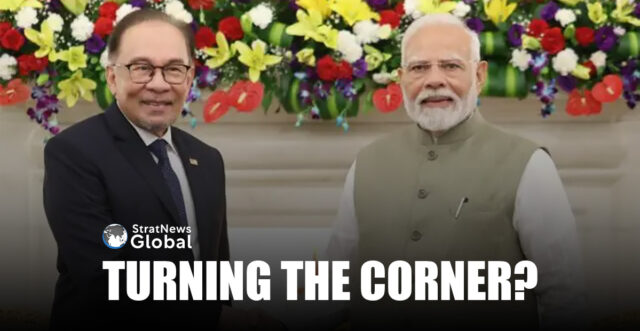India and Malaysia appear to have turned the corner on a testy bilateral relationship with the visit of Prime Minister Anwar Ibrahim.
“PM Modi namaskar, this is a very important personal visit and also on behalf of the Malaysian government because Pradhan Mantri Modi mere dost hai. He is not only prime minister, he is my friend. His friendship is sincere not only when I am prime minister but when I was a nobody.”
Modi was glad to welcome Ibrahim who took office in November 2022.
“This is Prime Minister Anwar Ibrahim’s first visit to India. I am glad I have the opportunity to welcome him in the beginning of my third term,” Modi said. “We are now completing the first decade of the enhanced strategic partnership and in the last two years we have seen new momentum in our relationship.”
He ticked off semiconductors, AI and Quantum as the new areas where the two countries should cooperate. Also elevating the bilateral relationship into a comprehensive economic partnership. The Malaysian leader concurred.
“We’ve agreed to enhance our relations to a comprehensive strategic partnership … in digital, investments, trade and construction, agriculture, research, all fields including military collaboration in terms of joint operations to safeguard our borders and we look forward to further enhanced relations.”
It’s not clear if Malaysia sees India as a supplier of military hardware. Traditionally, that country has sourced weapons from Europe and even Russia for fighter aircraft. Moves in the past to buy arms from China appear to have been thwarted after public outcries questioned the logic given disputes with Beijing over maritime territories.
“Malaysia may not want to engage India with a view to overtly balancing China,” said Rahul Mishra, Associate Professor at the Centre for Indo-Pacific Studies, Jawaharlal Nehru University. “Their policy is to maintain cordial ties with China at all costs. This is primarily due to trade dependence, tourist and student inflows but also diasporic linkages.”
Prime Minister Ibrahim would have likely probed India’s thinking on Malaysia joining the BRICS forum.
“It is now a full spectrum partnership,” noted Rahul Mishra, “It spans everything from technology and IT to palm oil even semiconductors.”
But Mishra believes Malaysia maybe nervous about India’s plans for setting up a semiconductor industry. Although the former is ahead in this game, the depth and resources of India’s industry suggest it could pose a challenge in the years ahead. He also sees complementarities in the field and believes the two sides can work together to become new leaders.
The visit saw a number of MoUs signed including recruitment of Indian labour, and cooperation in digital technology, financial services and health. India is also offering 100 ITEC scholarships to Malaysian students.
For India, Anwar Ibrahim would be a welcome change from former prime minister Mahathir Mohamad, who described the three million strong Indian diaspora there as not loyal to Malaysia and claimed that India had “invaded and occupied Kashmir”.
His successor Najib Razak gave sanctuary and permanent residence to Indian Muslim televangelist Zakir Naik, who faces criminal charges in India. While it’s not clear if Anwar Ibrahim has a different view of Naik, he evidently believes aligning closer to India makes sense at a time when New Delhi’s international stature is rising.
Thirty eight years in journalism, widely travelled, history buff with a preference for Old Monk Rum. Current interest/focus spans China, Technology and Trade. Recent reads: Steven Colls Directorate S and Alexander Frater's Chasing the Monsoon. Netflix/Prime video junkie. Loves animal videos on Facebook. Reluctant tweeter.





